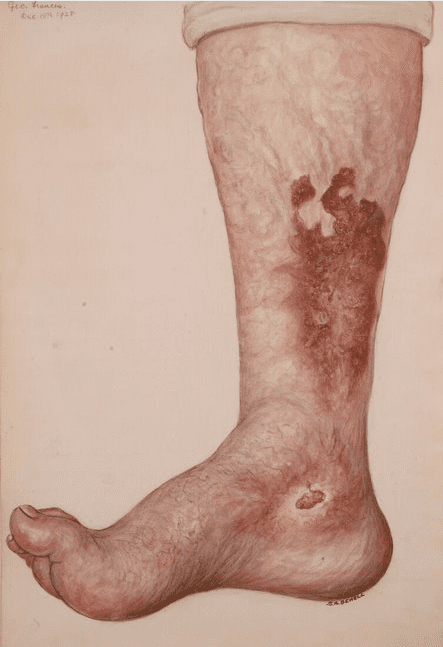Vani Ghai
Pune, India
 |
| Healing ulcers on the lower leg. The ulceration may have been due to varicose veins. Watercolor drawing by S. A. Sewell. Wellcome Collection. CC BY 4.0. |
The long and tiring battle with COVID has stimulated modern medicine to investigate new approaches to understanding the science of immunity. It has long been apparent that immune systems exist almost ubiquitously across the living and that all diseases involve the immune system. But even though immunology plays a decisive role in our understanding of the many mechanisms of disease, its role in defining the very biology of the self remains as poorly understood as ever. Even the biological basis of what distinguishes one human being from another is now only being slowly understood, and even less so what makes an individual’s self different from another’s.
To even attempt to answer this question, some philosophers have posed the question: what else is omnipresent, hidden, and unknown to all of us? Some postulate the existence of a vital force that allows life to function optimally. The role of medicine and its alternative branches would be to effect a cure by bringing back this vital force of nature into its optimal functioning.
It was Dr. Samuel Hahnemann who took this approach over a century ago by founding the now largely discredited practice of homeopathic medicine. He postulated the existence of a “vital force” not belonging to the physical body which enters the body to give it life at birth and leaves it at death.1 It would follow then that a disease would be nothing more than a disordered state of this very vital force, transcribed onto the mind and translated onto the body. The patient’s symptoms would be nothing more than the language of the diseased spirit; treatment should consist of treating not only the bodily symptoms, but also the remaining two thirds—the mind and the soul. In this formulation, immunology should somehow help to explain the mystery of what makes up the individual identity—what is self? What is non self?
In general, immunology can be simplified as merely a system of human biology that prevents foreign objects from damaging the basic physiology that allows us to run, walk and talk. It would consist of innate immunity (the quick immune response that does not require training) and adaptive immunity (which takes more time and entails the capacity to “learn” from previous encounters with a given target).2 Adaptive immunity learns to respond over time to an unknown phenomenon by changing its own nature. It does not remain the same after an interaction, however brief it may be.
But if everything is continuously changing or evolving, it becomes difficult to delineate the self and the non self. Simply put, the self–nonself framework posits that the elements originating from an organism (the “self”) do not trigger an immune response, while elements foreign to the organism (the “nonself”) do.3 When the self is attacked by the self, it is called an auto-immune attack that can wreak havoc on all the bodily systems.
The use of placebos in medicine has been invoked to shed further light on the mechanism of possible self-healing. It has been suggested that when you believe that a thing can help you, there is a change in the neurocircuitry of the brain and a subsequent change in your body, and that this would be seen as the self healing itself. A similar mechanism has been invoked to support the theories of homeopathic medicine, in which a selected substance is repeatedly diluted until not even a single molecule of the original substance can be expected to remain in the product and somehow is expected to have the greatest potency under the formulation that “like cures like.”4 However, when the self is cured by the self, we simply cast it aside as a physiological response to injury, leaving one to wonder whether the process of healing and regeneration as defined by our current understanding of pathology does not go beyond what meets the eye.
References
- KC, Chandran Nambiar. 2011. “Homeopathic Theory of ‘Vital Force’, and Modern Scientific Understanding of ‘Vital Processes’.” Redefining Homeopathy. September 25, 2011. https://dialecticalohmeopathy.wordpress.com/2011/09/25/homeopathic-theory-of-vital-force-and-modern-scientific-understanding-of-vital-processes-2/.
- Pradeu, T. Philosophy of Immunology. Cambridge: Cambridge University Press, 2020. doi:10.1017/9781108616706.
- Pradeu. Philosophy of Immunology.
- “Homeopathy.” Wikipedia. Last modified July 13, 2022, 21:29 UTC. https://en.wikipedia.org/wiki/Homeopathy.
VANI GHAI is a fourth year medical student in Pune. She believes in the power of intuition and circles and fiercely questions life as she encounters it.
Summer 2022 | Sections | Doctors, Patients, & Diseases

Leave a Reply